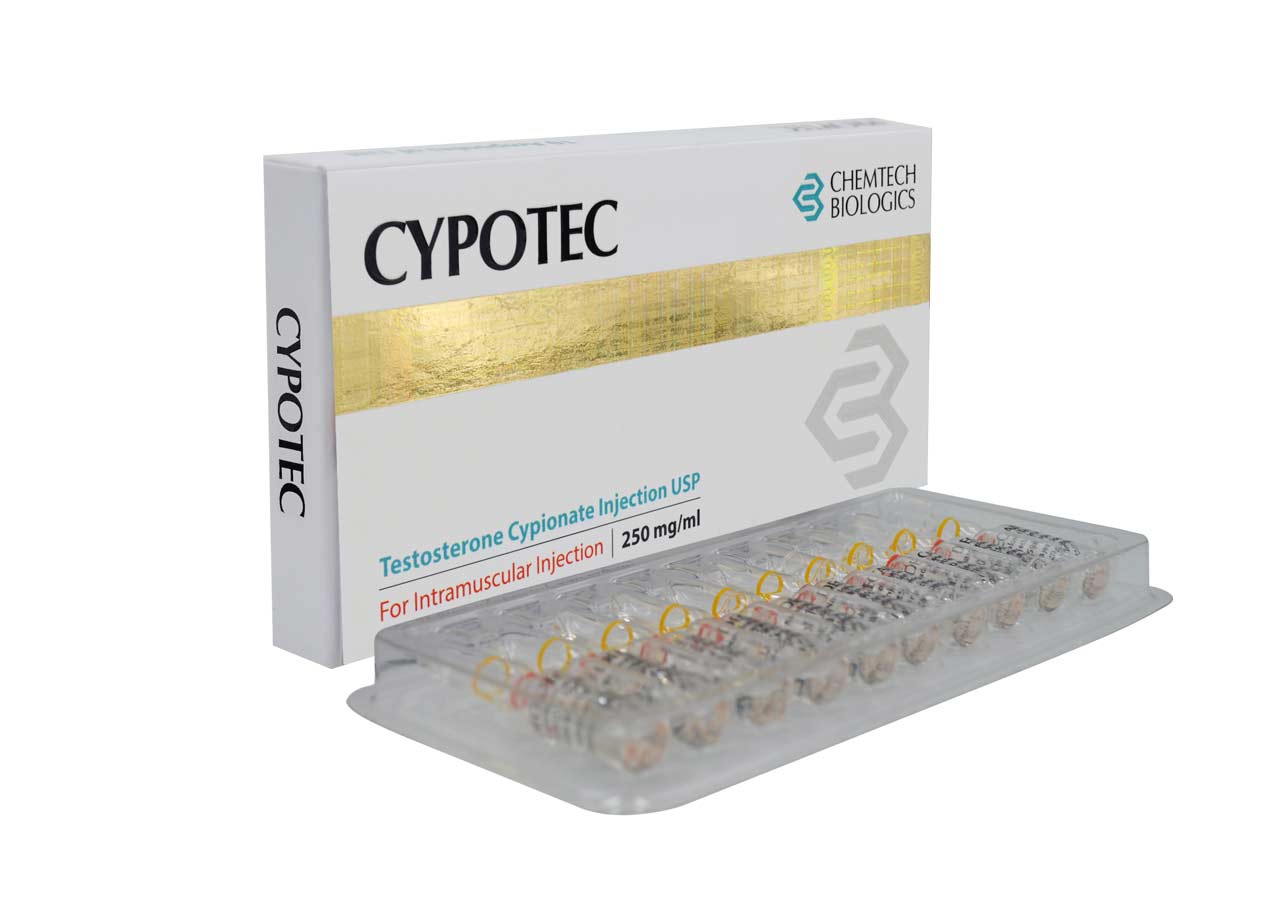
COMPOSITION :
Each ml contains :
Testosterone Cypionate USP 250 mg Oil Base q.s.
Indications and usage:
Testosterone Cypionate is indicated for replacement therapy in the male in conditions associated with symptoms of deficiency or absence of endogenous testosterone. -
1. Primary hypogonadism (congenital or acquired testicular failure due to cryptorchidism, bilateral torsion, orchitis, vanishing testis syndrome, or orchidectomy.)
2. Hypogonadotropic hypogonadism (congenital or acquired)-idiopathic gonadotropin or LHRH deficiency, or pituitary-hypothalamic injury from tumours, trauma, or radiation.
Contraindications:
1. Known hypersensitivity to the drug
2. Males with carcinoma of the breast.
3. Males with known or suspected carcinoma of the prostate gland.
4. Women who are or who may become pregnant.
5. Patients with serious cardiac, hepatic or renal disease.
Drug Interactions:
Androgens may increase sensitivity to oral anticoagulants. Dosage of the anticoagulant may require reduction in order to maintain satisfactory therapeutic hypoprothrombinemia. Concurrent administration of oxyphenbutazone and androgens may result in elevated serum levels of oxyphenbutazone. In diabetic patients, the metabolic effects of androgens may decrease blood glucose and therefore. insulin requirements.
Overdosage: There have been no reports of acute overdosage with the androgens.
Precautions: General: Patients with benign prostatic hypertrophy may develop acute urethral obstruction. Priapism or excessive sexual stimulation may develop.
Oligospermia may occur after prolonged administration or excessive dosage. If any of these effects appear, the androgen should be stopped and if restarted, a lower dosage should be utilized. Testosterone Cypionate should not be used interchangeably with testosterone propionate because of differences in duration of action. Testosterone Cypionate is not for intravenous use.
Information for patients:
Patients should be instructed to report any of the following nausea and vomiting. changes in skin color, ankle swelling, and too frequent or persistent erections of the penis.
Laboratory tests: Hemoglobin and hematocrit levels (to detect polycythemia) should be checked periodically in patients receiving long-term androgen -administration. Serum cholesterol may increase during androgen therapy. Drug/Laboratory test
Interferences: Androgens may decrease levels of thyroxine-binding globulin, resulting in decreased total T4 serum levels and increased resin uptake of T3 and T4 Free thyroid hormone levels remain unchanged, however, and there is no clinical evidence of thyroid dysfunction.
Carcinogenesis: There are rare reports of hepatocellular carcinoma in patients receiving long-term therapy with androgens in high doses. Withdrawal of the drugs did not lead to the regression of the tumors in all cases. Geriatric patients treated with androgens may be at an increased risk of developing prostatic hypertrophy and prostatic carcinoma although conclusive evidence to support this concept is lacking
Pregnancy: Teratogenic Effects. Pregnancy Category X. Nursing mother Testosterone Cypionate is not recommended for use in nursing mothers.
Dosage and administration: Testosterone Cypionate is for intramuscular use only It should not be given intravenously. Intramuscular injections should be given deep in the gluteal muscle. The suggested dosage for Testosterone Cypionate varies depending on the age, sex, and diagnosis of the individual patient Dosage is adjusted according to the patient’s response and the appearance of adverse reactions. Various dosage regimens have been used to induce pubertal changes in hypogonadal males: some experts have advocated lower dosages initially, gradually increasing the dose as puberty progresses with or without a decrease to maintenance levels. Other experts emphasize that higher dosages are needed to induce pubertal changes and lower dosages can be used for maintenance after puberty. The chronological and skeletal ages most be taken into consideration, both in determining the initial dose and in adjusting the dose. For replacement in the hypogonadal male, 50-400 mg should be administered every two to four weeks.
Warnings:
Hypercalcemia may occur in immobilized patients. If this occurs, the drug should be discontinued. Prolonged use of high doses of androgens. (principally the 17-delta alkyl-androgens) has been associated with the development of hepatic adenomas, hepatocellular carcinoma, and peliosis hepatic-all potentially life-threatening complications.
Geriatric patients heated with androgens may be at an increased risk of developing prostatic hypertrophy and prostatic carcinoma although conclusive evidence to support this concept is lacking. Edema, with or without congestive heart failure, maybe a serious complication in patients with preexisting cardiac, renal or hepatic disease.
Abuse in Sports
Abuse of this product in sports is highly discouraged. Chemtech Biologics does not take any responsibility for use of this product for any other purpose. This product should be used under proper medical supervision.





